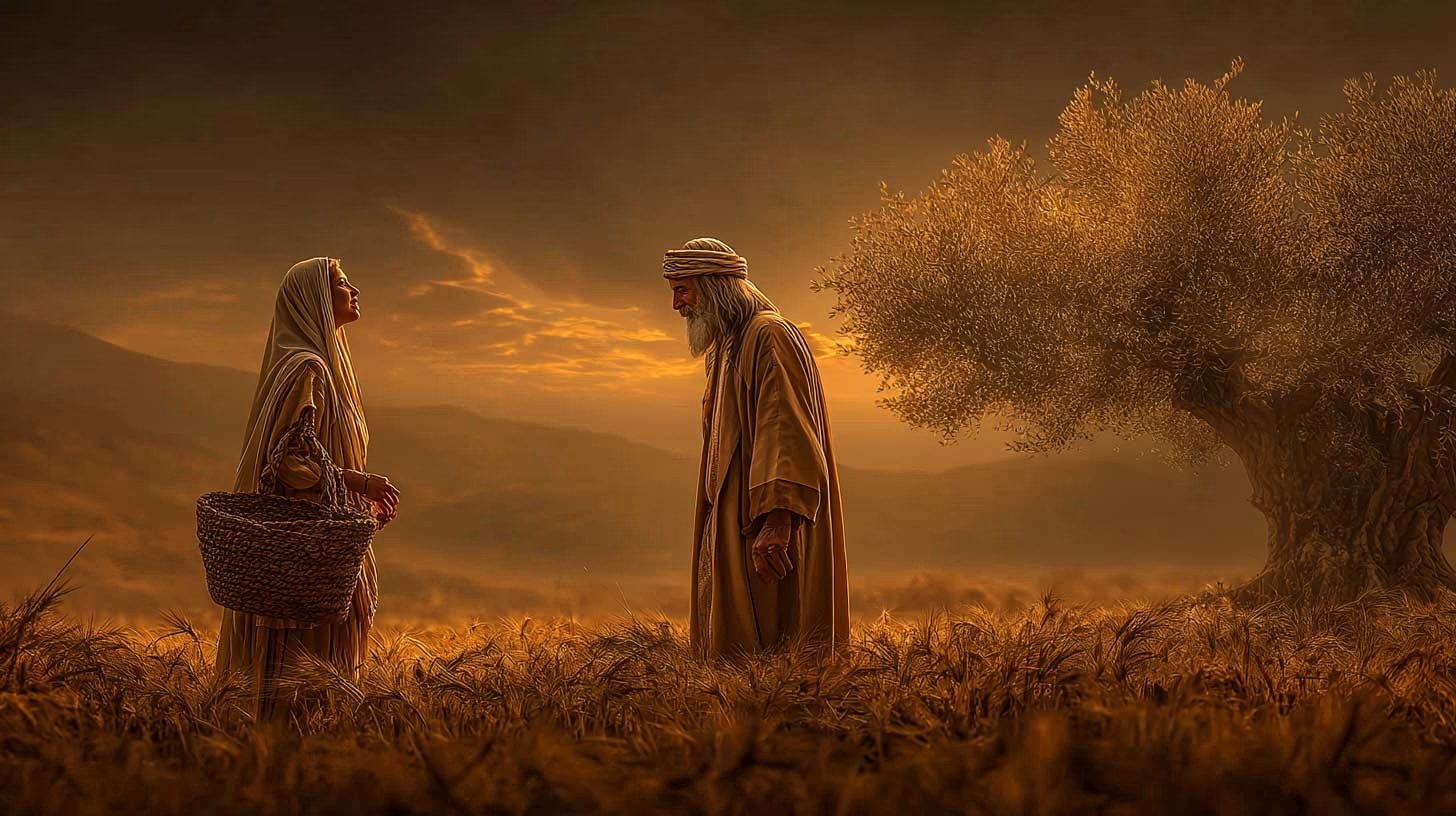
Ruth Chapter 2 reveals how God’s providence works through loyalty and humility. As Ruth gleans in Boaz’s field, her faithfulness brings protection, provision, and blessing. The story shows that even ordinary choices can lead to extraordinary redemption, reminding believers that God’s plan unfolds through everyday obedience.
Table of Contents
In the Book of Ruth Chapter 2, we witness a profound unfolding of God’s sovereign hand at work. This turns desperation into divine opportunity. As believers navigating today’s turbulent world—marked by political division, moral famine, and cultural shifts—this ancient narrative speaks directly to us.
Just as Ruth and Naomi faced uncertainty in a foreign land, we too grapple with challenges that test our faith. These range from economic instability to ethical dilemmas in leadership. Yet, through this chapter, Scripture reminds us that a believing populace is essential for any society, including our Constitutional Republic, to thrive.
By exploring Ruth’s story in depth, we uncover timeless principles of loyalty, generosity, and redemption. These equip us to apply biblical wisdom to contemporary concerns. They foster obedience and trust in God’s plan. This study builds on the foundation laid in our exploration of Ruth Chapter 1, where themes of loss and faithfulness set the stage for God’s redemptive work.
The Book of Ruth Chapter 2 not only continues the saga of two widows seeking survival. It also illustrates how ordinary acts of obedience can lead to extraordinary blessings. In a time when many feel like outsiders in their own culture—much like Ruth as a Moabite in Israel—this chapter encourages us to step out in faith.
We know that God’s providence orchestrates every detail. As Chuck Frank teaches, drawing from historical prayers of our founding fathers like George Washington and Benjamin Franklin, true governance and personal flourishing come from dependence on God and His Word.
This narrative challenges us to see beyond immediate hardships. It helps us recognize that what appears as coincidence is often divine appointment. This truth resonates deeply in our mission to illuminate current events with biblical truth.
Ruth’s Humble Initiative: Stepping Out in Faith
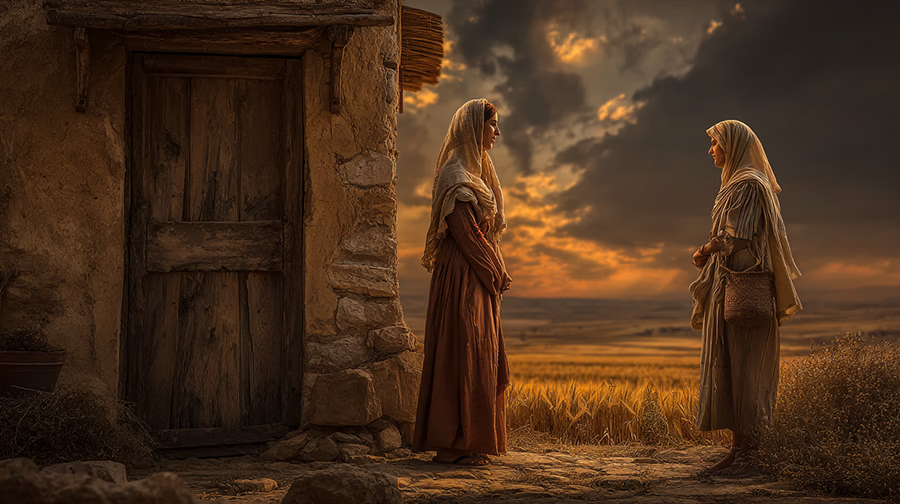
The Book of Ruth Chapter 2 opens with Ruth, the Moabite widow, taking bold yet humble action amid hardship. Having journeyed 60 miles from Moab to Bethlehem with her mother-in-law Naomi, Ruth recognizes their dire need for sustenance after a prolonged famine that had ravaged the land.
She approaches Naomi with respect, saying, “Please let me go to the field and glean heads of grain after him in whose sight I may find favor” (Ruth 2:2). Naomi consents, calling her “my daughter,” affirming their bond despite the cultural barriers that separated them.
This moment highlights Ruth’s initiative as a model for believers today. In a world where self-reliance often overshadows dependence on God, Ruth’s request teaches us to act faithfully within our circumstances.
She doesn’t demand provision but seeks permission to work. She is aware of her status as a foreigner in a society that might view her with suspicion. This echoes the biblical call to humility found in our Bible Messages series. There, we delve into verse-by-verse teachings that illuminate such character traits and their application to modern life.
Understanding Gleaning in Biblical Context
Gleaning, as described in Leviticus 19:9-10 and Deuteronomy 24:19, was God’s social safety net. It was a command not to harvest every corner of the field, leaving remnants for the poor, widows, and strangers.
Historically, this practice in ancient Israel ensured that the vulnerable could gather leftover crops without begging. It promoted dignity and community support. According to biblical scholars, gleaning wasn’t just charity.
It was a divine mandate reflecting God’s heart for justice. It allowed the needy to work for their provision while reminding landowners of their stewardship. Ruth embodies this by venturing out, not knowing she would “happen” upon the field of Boaz. He was a relative of Naomi’s late husband Elimelech.
The word “happen” underscores God’s providence, a theme central to the Book of Ruth Chapter 2. As Chuck Frank often emphasizes in our Today’s Concerns discussions, divine orchestration isn’t coincidence.
It’s God’s hidden hand guiding events. This is much like how He sustains nations through faithful individuals in times of moral and spiritual famine.
Boaz, described as “a man of great wealth” from Elimelech’s family (Ruth 2:1), arrives from Bethlehem. He greets his reapers with, “The Lord be with you,” to which they reply, “The Lord bless you” (Ruth 2:4).
Historically, commentaries note that such greetings were common. But they carried deeper meaning post-famine, signifying renewed faith in God’s provision. In our modern context, where economic instability and leadership failures loom, this reminds us to acknowledge God as Provider.
These echo the famines of integrity we face today. For deeper insights into scriptural overviews like this, explore our Books of the Bible page. It provides context before verse-by-verse study, helping believers connect ancient texts to current realities.
“Now behold, Boaz came from Bethlehem, and said to the reapers, ‘The Lord be with you!’ And they answered him, ‘The Lord bless you!'” (Ruth 2:4)
Boaz notices Ruth immediately, inquiring about her to his foreman. The servant reports her diligence: she’s the Moabite who returned with Naomi. She has gleaned from morning till now with only a brief rest, and politely asked permission.
This sets the stage for Boaz’s protective response. It illustrates how faithfulness catches the eye of those positioned to bless. Scholars like David Guzik highlight that Ruth’s hard work and humility stand out. This draws favor in a way that prefigures how God rewards steadfastness.
To further understand gleaning’s historical role, it was not merely economic but social. It prevented total destitution while fostering community interdependence. In ancient agrarian societies, fields were harvested manually.
Laws ensured edges and fallen stalks remained untouched. Ruth’s choice to glean reflects her courage, as foreigners risked hostility. Yet her action aligns with God’s law, showing obedience even in vulnerability.
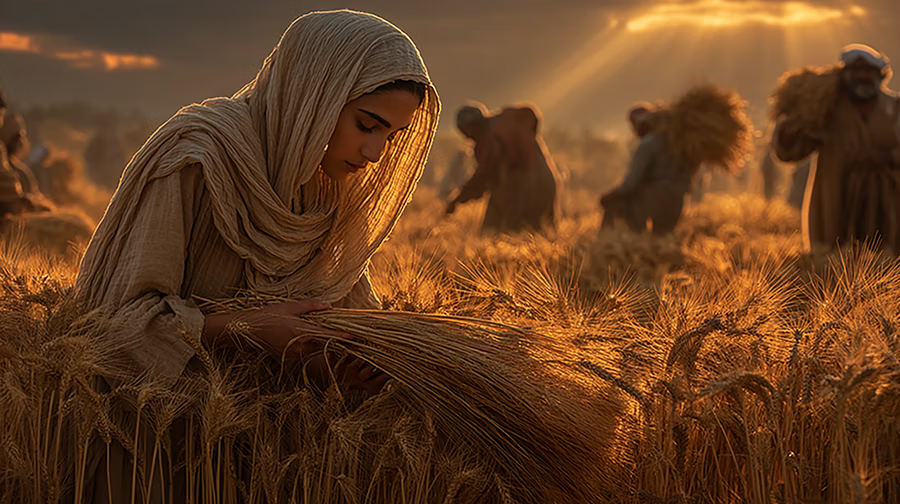
Boaz’s Recognition: Seeing Beyond Circumstances
As the narrative progresses in the Book of Ruth Chapter 2, Boaz addresses Ruth directly. He calls her “my daughter” and instructs her to stay in his field, close to his young women.
He commands his men not to touch her. He invites her to drink from their water vessels (Ruth 2:8-9). Ruth, astonished, falls on her face. She asks, “Why have I found favor in your eyes, that you should take notice of me, since I am a foreigner?” (Ruth 2:10).
This interaction reveals Boaz’s character as a man of integrity. He extends kindness beyond cultural norms.
Boaz’s reply is telling: “It has been fully reported to me, all that you have done for your mother-in-law since the death of your husband, and how you have left your father and your mother and the land of your birth, and have come to a people whom you did not know before” (Ruth 2:11).
He blesses her, invoking, “The Lord repay your work, and a full reward be given you by the Lord God of Israel, under whose wings you have come for refuge” (Ruth 2:12). This metaphor of God’s wings evokes protection, as seen in Psalms 91:4.
It ties into our mission at Trust and Obey with Chuck Frank to highlight Scripture’s guidance for life’s purpose, especially in turbulent times.
Ruth’s story challenges us to look beyond outward labels. Labeled a “Moabite”—a pagan outsider from a nation often at odds with Israel—she’s valued for her heart.
This mirrors how God selected Rahab, the Jericho prostitute, for David’s lineage. It confounds human wisdom (Joshua 2). As explored in our Five Smooth Stones series, a Scripture toolkit for spiritual growth, God prioritizes the heart over circumstances.
In contemporary terms, amid societal divisions and debates over immigration or cultural integration, believers must discern character over labels. This fosters unity in our Republic as outlined in our The 4-3 Formula biblical framework for growth.
Naomi’s earlier despair—”Call me Mara, for the Almighty has dealt very bitterly with me” (Ruth 1:20)—contrasts with this emerging hope. Through Ruth’s actions, we learn we’re not products of circumstances but vessels of God’s sovereignty.
This principle is vital for Christians facing modern “famines” like ethical erosion in politics. It is discussed in our G-Drop spontaneous scriptural commentary on unfolding events.
“The Lord repay your work, and a full reward be given you by the Lord God of Israel, under whose wings you have come for refuge.” (Ruth 2:12)
Ruth responds humbly, acknowledging her unworthiness: “Let me find favor in your sight, my lord, for you have comforted me and have spoken kindly to your maidservant, though I am not like one of your maidservants” (Ruth 2:13).
Boaz’s favor stems from reports of her loyalty. This shows how reputation built on faithfulness opens doors. Commentaries emphasize that Boaz’s knowledge of Ruth’s sacrifices—leaving family and homeland—highlights her conversion to Israel’s God. This is a pivotal theme.
For tools to cultivate such virtues, our Resources page offers free aids like the Proverbs Daily Planner, podcast archives, and community access.
Ruth’s Cultural Transition
Expanding on this, Ruth’s journey from Moab involved cultural and religious shifts. Moabites worshiped Chemosh, yet Ruth embraced Yahweh.
This conversion parallels modern testimonies of faith amid adversity. It reminds us that God’s refuge is available to all who seek Him.
The Meal of Honor: Generosity and Inclusion
A pivotal scene in the Book of Ruth Chapter 2 occurs at mealtime. Boaz invites Ruth to join the reapers: “Come here, and eat of the bread, and dip your piece of bread in the vinegar” (Ruth 2:14).
She sits beside them, and he passes her parched grain. She eats her fill but saves some for Naomi, demonstrating selflessness amid her own hunger.
This act of inclusion is profound. As a foreigner, Ruth would typically eat alone, perhaps shunned due to her background.
Yet Boaz honors her by offering the first dip—a sign of respect in ancient Jewish custom. This is noted in historical sources like the Dead Sea Scrolls and rabbinic literature. Dipping signified rank. Inviting an outsider first elevated her status, breaking social barriers.
This generosity prefigures Christ’s inclusive table. There, all are welcome regardless of background, as in the parable of the great banquet (Luke 14:15-24).
In our Community faith-centered fellowship, we encourage such acts of kindness. They build bonds that strengthen believers through shared reflections and prayer.
Boaz’s command to his men—”Let her glean even among the sheaves, and do not reproach her. Also let grain from the bundles fall purposely for her” (Ruth 2:15-16)—ensures abundance. Ruth gleans an ephah (about 5 gallons or 22 liters) of barley. This far exceeds expectations for a day’s work, providing for days ahead.
This teaches sowing in suffering: amid trials, continue daily duties to God’s glory. Ruth’s hard work yields provision, echoing our Proverbs daily 31-day meditation for instilling wisdom.
In today’s concerns, like veteran trauma addressed in our interview on Healing The Hero, faithfulness in small things leads to greater blessings. It shows how God uses ordinary obedience for extraordinary outcomes.
Historically, an ephah was a substantial amount. It was equivalent to a month’s wages for some, underscoring Boaz’s extravagance. Scholars note this as deliberate generosity, going beyond the law to embody grace.
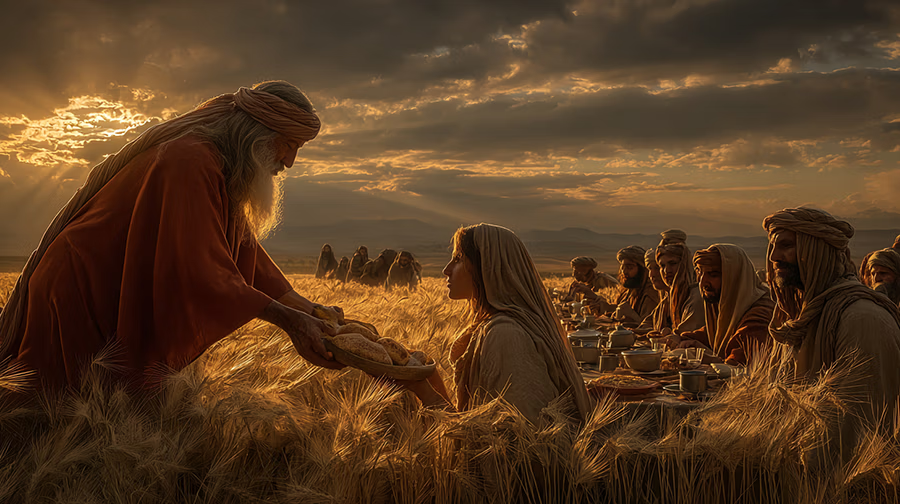
MidJourney Prompt: Biblical illustration in classical religious art style, showing Boaz in a red tunic offering bread to Ruth at a harvest meal, with reapers seated around a simple table in a barley field, warm golden tones emphasizing generosity and honor.
Alt Text: Boaz honoring Ruth at mealtime, symbolizing inclusion and kindness in the Book of Ruth Chapter 2.
Naomi’s Revelation: From Bitterness to Blessing
Returning home, Ruth presents the grain and saved food to Naomi. Naomi exclaims, “Where have you gleaned today? And where did you work? Blessed be the one who took notice of you!” (Ruth 2:19).
Ruth reveals it’s Boaz’s field. Naomi responds, “Blessed be he of the Lord, who has not forsaken His kindness to the living and the dead!… This man is a relation of ours, one of our close relatives” (Ruth 2:20).
This marks Naomi’s shift from despair to hope. Recognizing Boaz as a potential kinsman-redeemer (go’el in Hebrew), she sees God’s kindness extending to the dead (preserving family lines) and living.
The kinsman-redeemer custom, from Deuteronomy 25:5-10 and Leviticus 25, required a near relative to marry the widow. He would redeem land and raise an heir to prevent family extinction.
Boaz fits: near kin, wealthy, willing, and able. This foreshadows Christ as our Kinsman-Redeemer. He became human (near kin), was sinless (able), willing (Garden of Gethsemane), and paid fully (“It is finished,” John 19:30).
Our Mission page illuminates such truths for current events. It emphasizes dependence on Jesus amid non-commercial faith communities.
Ruth reports Boaz’s instruction to stay with his workers through barley and wheat harvests. Naomi affirms, “It is good, my daughter, that you go out with his young women, and that people do not meet you in any other field” (Ruth 2:22). This avoids gossip in small-town Bethlehem.
This advice reflects wisdom in navigating social dynamics. It is a lesson for today.
“Blessed be he of the Lord, who has not forsaken His kindness to the living and the dead!” (Ruth 2:20)
This chapter ends with Ruth dwelling with Naomi through the harvests. It symbolizes sustained provision. For similar themes, our Blog features reflections like the Book of Esther series. It blends history, power, and divine providence.
Naomi’s Emotional Shift
Naomi’s transformation is profound. She moves from viewing God as punitive to seeing His mercy. Commentaries suggest this as a turning point. There, human faithfulness intersects with divine plan.
The Kinsman-Redeemer: A Type of Christ
Delving deeper into the Book of Ruth Chapter 2, Boaz emerges as a type of Christ. He is the ultimate Kinsman-Redeemer. Four biblical requirements apply:
- Near of kin: Boaz is Elimelech’s relative; Christ became incarnate, “the Word became flesh” (John 1:14).
- Able to redeem: Boaz has wealth and status; Christ offers salvation freely, “for the grace of God has appeared” (Titus 2:11-14).
- Willing to redeem: Boaz protects Ruth without obligation; Christ prayed, “Not My will, but Yours” (Matthew 26:39), enduring the cross.
- Pays the full price: Boaz will negotiate in chapter 4; Christ declared, “It is finished” (John 19:30), completing redemption.
This typology encourages believers amid modern trials. These include cultural dark days where faith seems dim. In our QOHELETH ancient wisdom series, we challenge thought with Ecclesiastes insights. They parallel Ruth’s redemptive arc to life’s vanities.
As a Republic thrives with believers, understanding redemption fosters moral integrity and hope.
Prayers from founders like Benjamin Franklin, compiled here, reinforce this. Dependence on God averts calamities. Our 647 – Truth Starts Now campaign promotes such clarity. It urges biblical truth for our generation.
Typologically, Boaz’s actions mirror Christ’s. He becomes “kin” through incarnation, able through divinity, willing through love, and paying with His life. Scholars view Ruth as a microcosm of salvation history. With Boaz redeeming not just land but legacy.

Loyalty and Generosity: Core Themes Unveiled
The Book of Ruth Chapter 2 weaves loyalty and generosity as threads of faith. Ruth’s devotion to Naomi—leaving her homeland and gods—earns Boaz’s favor. It showcases hesed (loyal love) that goes beyond duty.
Generosity flows from Boaz. He exceeds legal requirements, dropping grain purposely and ensuring protection.
These virtues counter today’s self-centered culture. There, individualism often trumps community. In our G-Riff reflective commentary, we connect Scripture to spiritual questions. We urge generosity as a mark of true faith.
Ruth saves food for Naomi, embodying selflessness. Boaz honors her, showing true believers outgive others. They know they can’t outgive God (Luke 6:38).
Historical context: Post-famine harvest gratitude mirrors our need to thank God amid abundance. Gleaning laws promoted equity. They prevented hoarding while allowing work.
For archaeological insights, ancient texts confirm this as a widespread Near Eastern practice. It was adapted by Israel with divine emphasis.
Expanding, loyalty in Ruth contrasts Orpah’s return to Moab. It highlights choices in crisis. Generosity in Boaz reflects God’s character, as in Psalm 112:9.
Practical Application: Living Out Ruth Chapter 2 Today
Applying the Book of Ruth Chapter 2 to daily life means embracing providence in trials. When facing “famines”—job loss, family strife, or societal decay—take faithful steps like Ruth.
Glean in your “field”: serve humbly at work or home. Trust God orchestrates encounters for good (Romans 8:28).
Cultivate loyalty: Support loved ones sacrificially. Do so as in our Community page for sharing reflections and prayer requests.
Practice generosity: Share resources with “outsiders,” whether neighbors or strangers. Honor them as Boaz did Ruth. In political spheres, advocate for biblically inspired “safety nets.” These include welfare reforms that promote dignity.
They align with our mission for a believing populace in a thriving Republic.
Use tools like our Text GOD for confidential prayer encouragement via SMS. Sow in suffering: During hardship, do dailies to God’s glory. This builds faith as in Proverbs.
For example, in financial strain, volunteer or study Scripture daily. Watch for providential doors.
Reflect on modern parallels: Just as Ruth gleaned amid uncertainty, believers today can “glean” wisdom from challenges. Turn them into growth opportunities. Commentaries suggest Ruth’s story as a light in dark days. It inspires resilience.
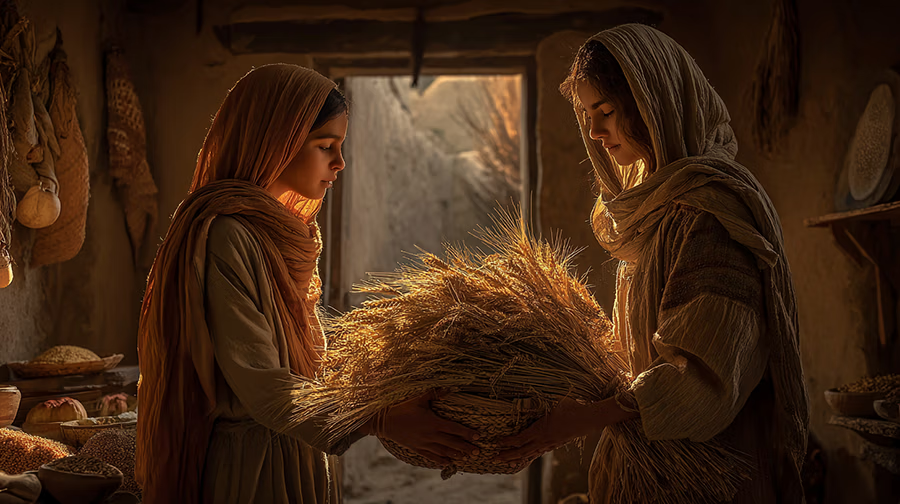
Sowing in Suffering: Building Faith Through Trials
A key lesson from the Book of Ruth Chapter 2 is sowing seeds of faithfulness amid adversity. Ruth works diligently despite grief. This yields abundance that sustains them.
This principle: Continue God-honoring actions in hard times. They build wisdom, understanding, and deeper trust in God.
In contemporary America, where integrity famines abound—from corrupt politics to personal betrayals—believers must sow truth and kindness. Our G-Dash rapid-fire encouragement offers quick, impactful truths for busy lives. It is much like Ruth’s daily gleaning.
Naomi’s bitterness transforms through Ruth’s actions. This shows circumstances don’t define us—God does, as He works all things for good.
For meditation, our Resources include podcast archives and video lessons. They tie this to growth. Expand this: Sowing involves persistence. Ruth gleaned all day, resting briefly, modeling endurance (James 1:2-4).
In trials, pray, serve, study—seeds that reap harvest.
Historically, famines in Israel tested faith. Yet God’s laws like gleaning provided hope. Today, apply by mentoring youth or aiding the needy. Sow eternal seeds.
Additional Insights: Cross-References and Modern Parallels
To enrich our study of the Book of Ruth Chapter 2, consider cross-references. Ruth’s refuge under God’s wings echoes Psalm 36:7. It portrays divine shelter.
Boaz’s blessing parallels God’s promises in Isaiah 54:5. There, He is Redeemer.
Modern parallels abound: In a world of displacement—like refugees today—Ruth’s story offers hope. Her integration through faithfulness models cultural assimilation rooted in faith. This is relevant to immigration debates.
As a type, Boaz points to Christ redeeming outsiders into His family (Ephesians 2:19).
In our site’s focus on constitutional thriving, Ruth Chapter 2 underscores that societal health stems from individual obedience and generosity. It counters selfishness.
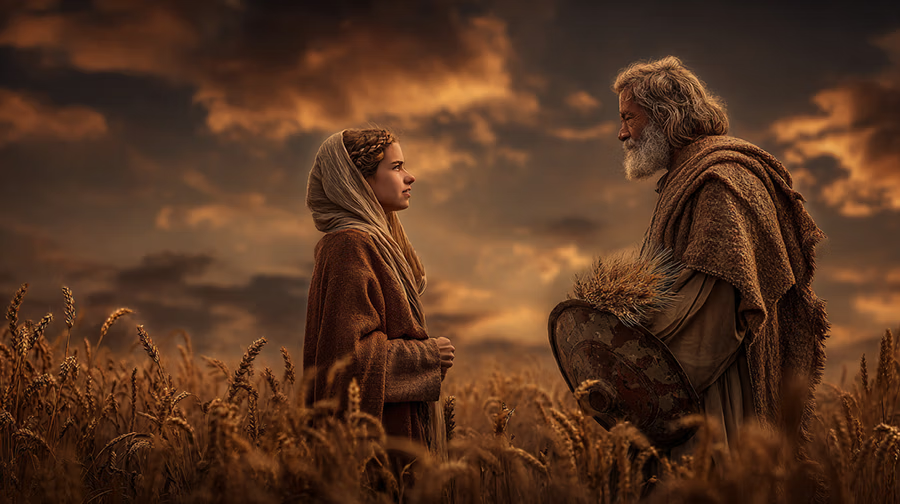
Conclusion: Embracing God’s Redemptive Plan
The Book of Ruth Chapter 2 invites us to trust God’s providence, loyalty, and redemption. From Ruth’s humility to Boaz’s generosity, we see a blueprint for faith. It sustains individuals and nations.
Reflect: Where is God calling you to glean faithfully today? Act by studying Scripture daily. Do so perhaps through our Bible Messages or joining our community.
In obedience, experience His wings of refuge. This empowers a believing populace for our Republic’s thriving. This chapter reminds us that in dark days, God’s light shines through faithful acts. It leads to unexpected blessings.
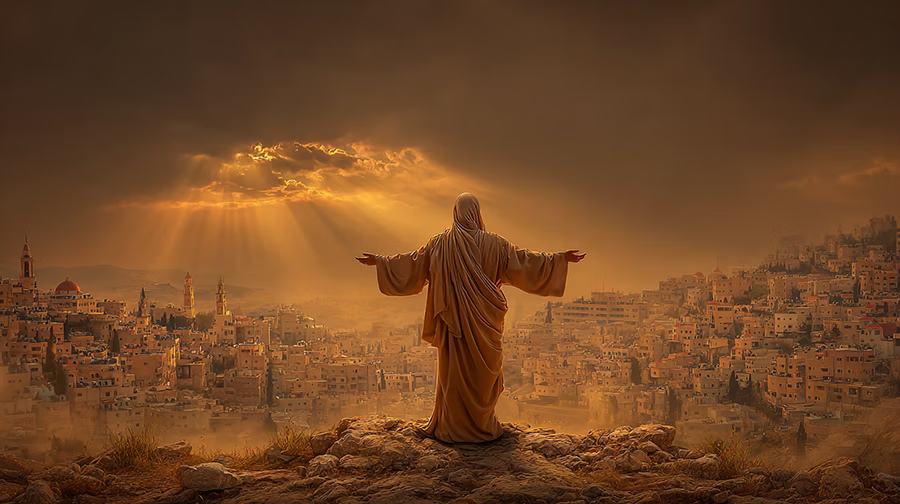
Frequently Asked Questions (FAQs)
What does gleaning symbolize in the Book of Ruth Chapter 2?
Gleaning represents God’s provision for the vulnerable, teaching humility and dependence. It encourages believers to trust divine opportunities in daily work, as explored in our Bible Messages for deeper application.
How does Boaz foreshadow Jesus as Kinsman-Redeemer?
Boaz meets redemption criteria—kinship, ability, willingness, and full payment—mirroring Christ’s incarnation, sinlessness, sacrifice, and victory over sin. This typology strengthens faith in trials.
Why is loyalty emphasized in Ruth’s story?
Ruth’s devotion to Naomi amid loss highlights faithfulness that honors God, leading to blessings. It applies to modern relationships, fostering community as in our Christian Community fellowship.
How can I apply sowing in suffering today?
In hardships, perform daily duties to God’s glory, building resilience. Use our Resources like the Five Smooth Stones toolkit for practical spiritual growth.
Further Reading
- Blue Letter Bible Commentary on Ruth 2: In-depth verse analysis with historical notes.
- GotQuestions.org: Kinsman-Redeemer Explained: Theological overview with scriptural ties.
- Dead Sea Scrolls Digital Library: Primary sources on Jewish customs like dipping rituals.
- Enduring Word: Ruth Chapter 2 Commentary: Detailed exposition by David Guzik.
- Bible.org: Light in Dark Days (Ruth): Insights on Ruth as hope in trials.
- GotQuestions.org: Gleaning in the Bible: Explanation of the practice’s significance.

